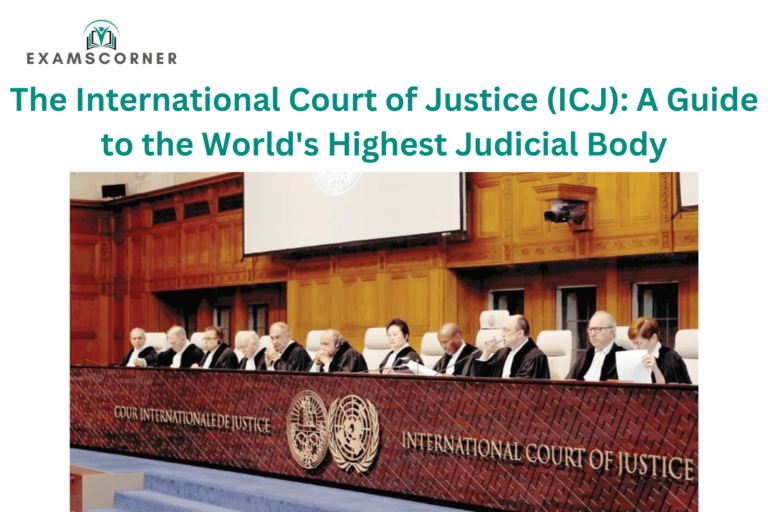Introduction
The International Court of Justice (ICJ) is the principal judicial organ of the United Nations (UN), entrusted with resolving disputes between states and providing advisory opinions on international legal matters. Established in 1945, the ICJ serves as a cornerstone of the international legal system, promoting the peaceful resolution of conflicts and the rule of law.
Historical Background
The ICJ was established under the UN Charter in 1945, succeeding the Permanent Court of International Justice (PCIJ), which operated under the League of Nations. The ICJ began its work in April 1946, after the dissolution of the PCIJ. The court is located in the Peace Palace in The Hague, Netherlands, symbolizing its role as a mediator of global peace and justice.
Key Functions of the ICJ
The ICJ performs two primary functions:
- Contentious Cases: The ICJ settles legal disputes submitted by states. These disputes can involve a wide range of issues, including territorial boundaries, maritime rights, diplomatic relations, and breaches of international law. Its judgments are binding on the parties involved.
- Advisory Opinions: The ICJ provides non-binding legal opinions on questions referred to it by authorized UN bodies and specialized agencies. These opinions help clarify international law and guide the actions of states and organizations.
Structure of the ICJ
The ICJ comprises 15 judges elected for nine-year terms by the UN General Assembly and Security Council. The judges are chosen based on their qualifications, ensuring a representation of the world’s major legal systems. Key aspects of the ICJ’s structure include:
- The Presidency: The President and Vice-President are elected by the judges to oversee court proceedings.
- The Registry: The administrative arm of the ICJ, responsible for case management and documentation.
Jurisdiction of the ICJ
The ICJ’s jurisdiction is limited to states and encompasses:
- Contentious Jurisdiction: States must consent to the court’s jurisdiction, either through treaties, special agreements, or declarations accepting its compulsory jurisdiction.
- Advisory Jurisdiction: The ICJ can issue advisory opinions on legal questions referred by the UN General Assembly, Security Council, or other UN agencies.
Landmark Cases of the ICJ
Over the decades, the ICJ has handled several high-profile cases that have shaped international law:
- The Corfu Channel Case (1949): Established principles of state responsibility for actions impacting other states.
- The North Sea Continental Shelf Cases (1969): Clarified maritime boundary delimitation under international law.
- The Nicaragua Case (1986): Addressed issues of state sovereignty and non-intervention, ruling against U.S. actions in Nicaragua.
- The Chagos Archipelago Advisory Opinion (2019): Declared that the U.K. should end its administration of the Chagos Archipelago, reaffirming the right to self-determination.
ICJ vs. ICC: Understanding the Difference
While the ICJ focuses on disputes between states, the International Criminal Court (ICC) deals with individual accountability for crimes such as genocide, war crimes, and crimes against humanity. The ICJ’s jurisdiction is limited to states, whereas the ICC prosecutes individuals.
Challenges and Criticisms of the ICJ
Despite its vital role, the ICJ faces several challenges:
- Jurisdictional Limitations: The court’s jurisdiction is based on state consent, limiting its ability to act in many cases.
- Enforcement Issues: The ICJ relies on the UN Security Council for enforcement, which can be hindered by political considerations and veto power.
- Perceived Bias: Some states view the ICJ’s rulings as influenced by geopolitical interests.
The ICJ’s Role in Promoting Global Peace
The ICJ has played a pivotal role in:
- Encouraging states to resolve disputes peacefully through legal means.
- Developing international legal principles that strengthen global governance.
- Acting as a forum for states to address grievances in a structured and impartial manner.
Conclusion
The International Court of Justice stands as a beacon of international law and justice. Despite its limitations, the ICJ continues to foster a more just and peaceful world by resolving disputes, promoting legal clarity, and upholding the rule of law. As global challenges grow increasingly complex, the ICJ’s role remains indispensable in shaping a future founded on cooperation and justice.



